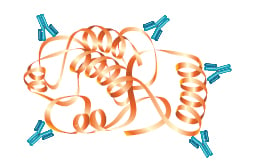-
US | en
- Products
- Browse by Product Type
- Primary Antibodies

Monoclonal and Polyclonal Antibodies
Primary antibodies directly bind specific antigens with high specificity and affinity. They can be either monoclonal antibodies, which bind to a specific epitope, or polyclonal antibodies that bind to several epitopes of an antigen. Primary antibodies are predominantly used in immunoassays such as ELISA, western blot, immunohistochemistry, chromatin immunoprecipitation (ChIP), or flow cytometry. For antigen detection, primary antibodies can be conjugated to reporter enzymes or fluorophores, which facilitates quantification or analysis of antigen expression.
Conjugated primary antibodies often eliminate the need for secondary antibodies; however certain experimental conditions may require their use. Secondary antibodies are developed against the Fc portion of a purified primary antibody, and are often conjugated for antigen detection purposes. In addition, they are developed against the host species of the primary antibody, such that a primary antibody raised in goat will require an anti-goat secondary antibody raised in a species other than goat.
Polyclonal antibodies consist of a mixed pool of immunoglobulin molecules that bind to several different epitopes found on a single antigen . Polyclonals are usually produced in rabbits, donkeys, sheep, and goats, and are purified from serum. In contrast, monoclonal antibodies bind to a single epitope within a target antigen.
Monoclonal v Polyclonal Antibodies Comparison
| Area | Monoclonal | Polyclonal |
|---|---|---|
| Epitope | Specificity for a single epitope. | Varying specificities to multiple epitopes. |

|

|
|
| Targeting | Identifies whether a particular region of a protein is present | Identifies the entire target protein via binding at multiple sites . Since multiple epitopes are targeted, there is a higher likelihood of detection of the target |
| Cross-Reactivity | May cross-react with other proteins that share this epitope, such as isomers or common motifs | Higher background and cross-reactivity possible due to detection of multiple epitopes, any of which may be shared by related proteins |
| Sensitivity | Usually less sensitive since only a single antibody molecule binds to each target | More sensitive because signal is amplified through the binding of several antibodies per target |
| Production Cost | More expensive to produce initially, but available in an unlimited supply | Less expensive to produce initially, but supply is limited to immunized animal(s). There will be greater variability between preparations |
Bio-Rad's range includes thousands of high quality monoclonal and polyclonal primary antibodies for a variety of research areas including cancer, stem cells, neuroscience, veterinary research and innate immunity.
Antibodies Available
| Description | Specificity | Target | Format | Host | Isotype | Clone | Applications | Citations | Product Type | Code | Validation Types |
|---|

Custom Services
Can’t find what you’re looking for? Bio-Rad offers custom antibody development services for monoclonal or polyclonal antibody generation, antibody production and modification services. Our monoclonal antibody generation service is suitable for any antibody requirement. Just complete the short inquiry form and one of our specialists will contact you to discuss your research needs.

Resources
For assistance with your experiments, visit our resources section for detailed protocols, tips, guides and educational articles.